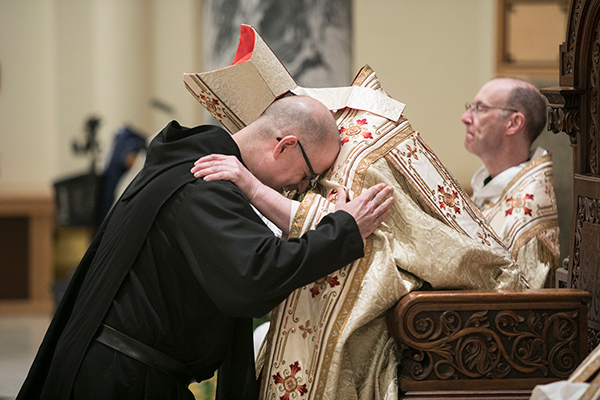Tools for Peace
Fr. Adrian Burke, OSB
Thursday, February 3, 2022

“Love your neighbor as yourself…never give a hollow greeting of peace…love your enemies…
if you have disputes with someone make peace before the sun goes down … etc.”
Rule of Saint Benedict 4
We live in divisive times. People are experiencing discord within families, at work, among friends, and even at church! It seems worse than ever, but it’s always been the case that our “need to be right” tends to get in the way of our desire for peace. Benedictines are men and women committed to peace. I’ve mentioned before in this column that, from early times, Pax, the Latin word for peace, had become a sort of Benedictine motto.
To see why, just look at chapter 4 of the holy Rule. The above quotation is a series of verses scattered throughout RB 4. The whole chapter is a long list of “tools for good works,” actions monks practice to exercise and strengthen our Christian identity. In other words, the things we do that prove we belong to Christ and that we are different from the world (RB 4:20).
In the prologue to the Rule, St. Benedict writes that if we desire true and eternal life, quoting Psalm 34, then let peace be your quest and aim. So, one way of understanding the list of good works in RB 4 is to see it as a program for realizing PEACE.
As the list itself seems to assert, if it’s going to be real and not a deception (“rid your heart of all deceit” is number 24 on the list), peace must begin with ourselves! There can be no “world peace” unless we establish peace within our own hearts. First of all, writes Benedict, love the Lord God with your whole heart, your whole soul and all your strength (4.1), the first item on the list. Loving God with heart, soul, and strength establishes a “right-ordered relationship” with the Source of all truth and reality. Second on the list is, you guessed it: love your neighbor as yourself.
These are the two components of Jesus’ “Great Commandment” upon which everything else hangs. Loving God and loving neighbor is precisely how we love ourselves well. And we must love ourselves, not in a selfish or egoistic way, but as God loves us, by accepting oneself as one is –sinful and in need of forgiveness, yes, but also holy, a child of God; sometimes hurting and confused, sometimes fearful and lost, but always absolutely loved by God.
Self-acceptance is what I call “being at peace” with the self. Without a peaceful heart that cares for oneself in this way, we can’t really love the neighbor as “self.” Taking care of self – mindful of our health (mental, emotional, and physical), and tending to authentic human needs such as friendship, intimacy, community, and purpose – is the basis for peace in the world. Safeguarding my own peace of mind and heart, I can then turn outward to help respond to the needs of others. The whole of St. Benedict’s Rule is riddled with policies for securing peace within the community, but this is especially the case in RB 4, where we also read these verses: “Relieve the lot of the poor … help the troubled and console the sorrowing … do not act in anger or nurse a grudge … never turn away when someone needs your love … speak the truth with heart and tongue … do not repay a bad turn with another … do injury to no one … do not grumble or speak ill of others … dash wrongful thoughts against Christ … guard your lips from harmful or deceptive speech.”
These are some of the “tools for peace” that establish lasting harmony in the community, within us and among each other. May Peace be with you as you strive to be men and women of Peace!